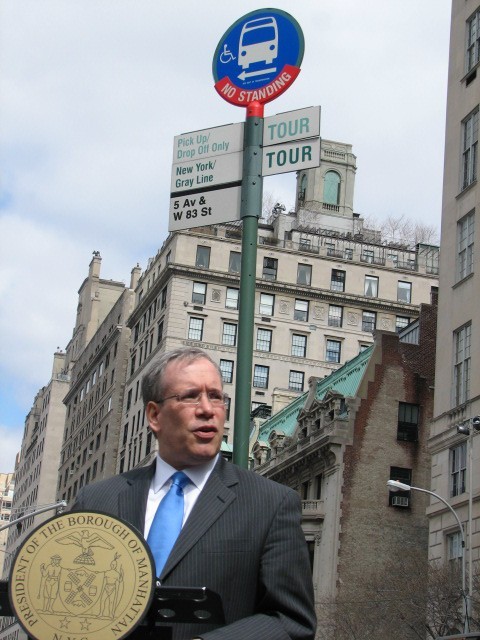
Manhattan Borough President Scott Stringer made the state of New York City's transit system one of his top policy issues in the run-up to next year's local elections, saying in a speech this morning that finding new revenues for transit would be his top priority in Albany if elected mayor.
"I believe we need to get back to an era in which public transportation is acknowledged as an essential civic responsibility — right alongside public safety and education," he said. "Today, the MTA is being held together with a combination of unprecedented borrowing, and fare hikes as far as the eye can see... The fundamental problem is a lack of reliable funding streams for transit."
Speaking to the Association for a Better New York, a civic association tied to the city's business elites, Stringer called for new dedicated transit revenues (specifically, reinstating the commuter tax), and the creation of an infrastructure bank just for transit, and the creation of new bus, light rail and subway lines. "This is about building the infrastructure for our success," said Stringer. "It's about attracting talent and keeping it here. It's about minimizing the frustration of getting to work and the uncertainties of getting home."
On the revenue side, Stringer called for bringing back the commuter tax, which would be levied on incomes of suburban residents working in New York City. A commuter tax dedicated to the city's general fund was collected until 1999, when Assembly Speaker Sheldon Silver allowed the repeal to pass in order to win suburban support for Democrats. According to Stringer, reinstating the tax at the same rate of 0.45 percent would raise $725 million annually, which he said should be dedicated entirely to the MTA.
Stringer admitted that getting suburban legislators in Albany to agree to tax themselves to pay for transit would be a tough lift, but that doing nothing isn't an option. "The politicians can put their heads in the sand," said Stringer. "We're going to end up collapsing our mass transit system."
He also promised that it would be his top legislative priority if elected mayor, akin to Mayor Bloomberg's push for mayoral control upon taking office. "Every mayor, when they're elected, gets one big ticket from Albany," he said.
The new revenues would support both the MTA's operating budget, where they could be used to prevent fare hikes, restore service cuts, or add new service, and the MTA's capital budget, where they would fund expansions of the system and ongoing maintenance.
A clever, wonky touch was Stringer's proposal to transfer revenues from the dedicated mortgage recording tax, which currently help fund the MTA's operating budget, to the capital budget. Because the real estate market has especially pronounced booms and busts, the mortgage recording tax brings in wildly divergent sums from year to year, making budgeting more difficult. "Relying on a source of revenue that can plunge 75 percent over five years is no way to run a railroad," said Stringer.
Capital budgets are set over the long term, allowing for the swings in mortgage tax revenues to be smoothed out more easily. Stringer proposed putting the new commuter tax revenue toward operations, allowing the mortgage tax to be shifted safely toward capital expenses.
The mortgage tax revenues, on average about $400 million a year, according to Stringer, would seed a new infrastructure bank dedicated to funding transit projects. Stringer hopes to borrow against that revenue, whether with public tax-exempt bonds or through private financing from groups like the pension funds of SEIU Local 32BJ, to raise $10 billion that could be spent immediately. When asked about the advantage of private financing over cheaper public bonding, Stringer said that establishing the dedicated revenue for capital construction was more important than the financing mechanism.
With $10 billion, Stringer has a long list of projects he'd like to get built: the Triboro Rx line (a circumferential subway route from Brooklyn to the Bronx built on existing rights-of-way), new bus rapid transit lines heading to neighborhoods like Flushing and Flatbush, an AirTrain to LaGuardia Airport, and light rail lines on 42nd Street and in Red Hook. At the same time, Stringer argued that the MTA must stop building vanity projects like the Fulton Street transit hub, which he said "will do nothing to add capacity."
Stringer mentioned other potential revenue streams, specifically saying that Sam Schwartz's bridge toll plan "deserves discussion," but focused his remarks on the commuter tax. Stringer supported congestion pricing in 2007.
With today's speech, Stringer becomes the second major mayoral candidate to lay out a platform for funding transit. In October, former Comptroller Bill Thompson laid out his plan in an op-ed in the New York Post. He also proposed restoring the commuter tax, as well as instituting a new $1 billion a year weight-based vehicle registration fee, but also repealing the payroll mobility tax, which would offset much of the new revenue. The commuter tax is a particularly appealing revenue stream for mayoral candidates, as it would not fall on a single potential voter.
The putative front-runners for mayor, Council Speaker Christine Quinn and Public Advocate Bill de Blasio, have yet to speak at length about transit funding.
MTA spokesperson Adam Lisberg said that the authority wouldn't support or oppose any particular funding proposal at this point, but that he was happy to hear Stringer talking about the issue. "The MTA needs more funding," said Lisberg, "and the MTA needs a more reliable funding source."





